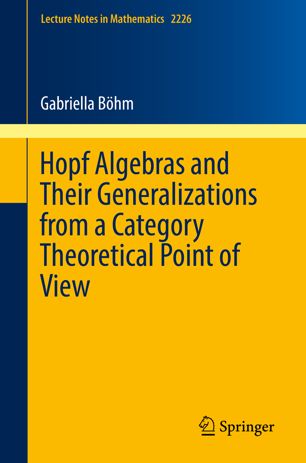

Most ebook files are in PDF format, so you can easily read them using various software such as Foxit Reader or directly on the Google Chrome browser.
Some ebook files are released by publishers in other formats such as .awz, .mobi, .epub, .fb2, etc. You may need to install specific software to read these formats on mobile/PC, such as Calibre.
Please read the tutorial at this link: https://ebookbell.com/faq
We offer FREE conversion to the popular formats you request; however, this may take some time. Therefore, right after payment, please email us, and we will try to provide the service as quickly as possible.
For some exceptional file formats or broken links (if any), please refrain from opening any disputes. Instead, email us first, and we will try to assist within a maximum of 6 hours.
EbookBell Team

4.7
66 reviewsThese lecture notes provide a self-contained introduction to a wide range of generalizations of Hopf algebras. Multiplication of their modules is described by replacing the category of vector spaces with more general monoidal categories, thereby extending the range of applications.
Since Sweedler's work in the 1960s, Hopf algebras have earned a noble place in the garden of mathematical structures. Their use is well accepted in fundamental areas such as algebraic geometry, representation theory, algebraic topology, and combinatorics. Now, similar to having moved from groups to groupoids, it is becoming clear that generalizations of Hopf algebras must also be considered. This book offers a unified description of Hopf algebras and their generalizations from a category theoretical point of view. The author applies the theory of liftings to Eilenberg–Moore categories to translate the axioms of each considered variant of a bialgebra (or Hopf algebra) to a bimonad (or Hopf monad) structure on a suitable functor. Covered structures include bialgebroids over arbitrary algebras, in particular weak bialgebras, and bimonoids in duoidal categories, such as bialgebras over commutative rings, semi-Hopf group algebras, small categories, and categories enriched in coalgebras.Graduate students and researchers in algebra and category theory will find this book particularly useful. Including a wide range of illustrative examples, numerous exercises, and completely worked solutions, it is suitable for self-study.